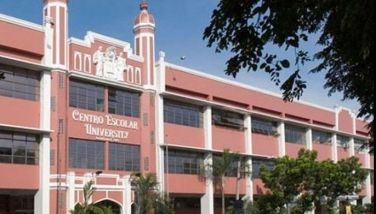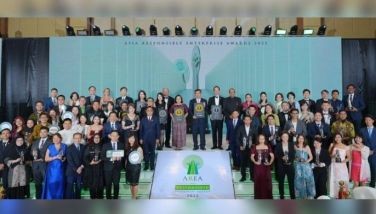No better weather
I had a very fruitful trip out to the US these past couple of weeks, mainly to participate in the fifth PEN World Voices Festival in New York, a gathering of about 160 writers from more than 50 countries. The festival was focused on the theme of “Evolution/Revolution” — the political, social, and economic changes taking place around the world, both fast and slow, and their impact on literature (or, conversely and perhaps more hopefully, the impact of literature on societies and governments at large).
I was, I was told, the first Filipino to be invited to the World Voices Festival, thanks to the efforts of Filipino-American novelist Jessica Hagedorn — who was, unfortunately, too burdened with teaching duties to attend the festival herself. But in three separate events, I had a chance to meet and interact with fellow writers from all over — as well as to touch base with New York-based Fil-Am writers like Luigi Francia and Angel Shaw, and even the traveling Robby Kwan Laurel, who just happened to be attending a conference upstate at the time.
Like true Pinoys, the US side of the family — my mom Emy, daughter Demi, sister Elaine, sister-in-law Mimi, nephew Toto, and niece Eia, not to mention Beng, who followed a day later for a surprise reunion with everyone else — all trooped to New York to attend my talks and readings, soon to be joined by Pinoy expat-friends including the photographer Dominique James and artist Kim Bello.
The first event, “Prison Deform,” gathered a group of four writers — Hwang Sok-yong (South Korea), Khet Mar (Burma), Susan Rosenberg (US) and myself, who had all spent some time in prison — to talk about how that experience had helped shape our writing. Surprisingly (or perhaps not), we found and agreed that we had put the worst part of our confinements behind us, and that, indeed, writing and writing well was the best revenge.
The main reading itself — held at the Great Hall of Cooper Union, a pillared, cavernous amphitheater that put any speaker literally in the spotlight — went off very well, with each of the nine scheduled readers given eight minutes on the podium: Muriel Barbery (France), Nicole Brossard (Canada), Narcís Comadira (Spain), Jose Dalisay (Philippines), Edwidge Danticat (US/Haiti), Péter Nádas (Hungary), Sergio Ramírez (Nicaragua), Raja Shehadeh (Palestine), and Salman Rushdie (UK/India). I was in formidable and formidably talented company — Ramirez, for example, served as vice president of Nicaragua aside from being an accomplished novelist — and we spoke against the backdrop of a screen on which our words were electronically scrolled.
I’ve long lost my stage fright — 25 years of teaching and lecturing will take care of that — but I still get star-struck in the company of genuine celebrities (excluding politicians) and my encounter with the festival’s luminary and chairman, Salman Rushdie, proved no exception. Thanks to a very tight window between my own first event and the Big One in Cooper Union, many blocks away, I arrived too late to clink wineglasses with my fellow readers who had foregathered in a holding room, and I hovered in the background as the official photographer (with the improbable but utterly appropriate name of Beowulf Sheehan) snapped pictures of everyone and as Rushdie — who, I was comforted to find, is my close match in sheer poundage — exchanged pleasantries with those around him, one hand in a pocket, beyond the reach, at least for the moment, of fatwas and such. But I, on the other hand, could’ve nailed him, could’ve peppered him with questions like “So what do you really think of organized humanism?” or “What time of the day or night do you feel most comfortable writing?” but I didn’t want to spoil the good time he was having.
I could’ve told him what my mother did when she heard that I was coming to New York to read something of mine along with a much more famous writer named Salman Rushdie — she ran to the Centreville Public Library and loaned out an armful of Rushdie opuses, only to find that she couldn’t get beyond Page 3. “Bakit ganiyan siya sumulat, Toto?” she asked me when I arrived, employing the diminutive by which she’s addressed me, her first-born, all my life. “Sumakit ang ulo ko, sinauli ko na lang ang libro!” she cried. I’d wanted to tell her, “Now, now, I’m sure that’s not what Salman’s mother would say,” but I let it drop. Truth to tell I sometimes get a headache myself from the prose of Rushdie and his Indic brethren, which makes me feel like I’m biting through five layers of chocolate cake. I’d thought of bringing along my copy of Shalimar the Clown — the gift of another friend — for him to sign, but it weighed about as much as five or six copies of my own novel, and I couldn’t go to the reading with that in hand.
I read a passage from Soledad’s Sister that introduced the audience to our physical and social landscape, and by the end of my eight minutes I was happy to have come and given voice to our literature, still so little seen and heard even in the world’s largest literary marketplace (a shortcoming that, among others, Miguel Syjuco’s Ilustrado should soon help redress, building on the headway gained by Bulosan, Gonzalez, Santos, Sionil Jose, Hagedorn, Rosca, Roley, Linmark, and others). I’m sure my mother, in the audience, felt the same. (And I did have my moment with Mr. Rushdie: after the readings, I took his hand and said, “A pleasure to meet you, Mr. Rushdie.” “Likewise,” he said, before he was whisked off to indulge his autograph-seekers and I joined family and friends for a late dinner at a ramen place on the Lower East Side.)
My last event, a reading titled “Defiance” at an apparently popular venue called Joe’s Pub, was dedicated to the memory of that one man who stood up to a tank at Tiananmen Square in 1989. We were all asked to read pieces not written by us but manifesting and celebrating that same spirit of resistance to unjust authority. It was a lively and varied reading; one participant read from a letter of Mahatma Gandhi to the British raj, another a letter of a former US military prosecutor urging the dropping of charges against an Iraqi detainee who had been arrested at 16 and kept for six years at Guantanamo.
Most of us read poetry, and before leaving for New York I had asked some writer-friends like Rio Almario, Jimmy Abad, and Mario Miclat for their recommendations, wanting to represent Philippine literature at its defiant best. They gave me terrific suggestions, but in the end — taking the atmosphere of a crowded pub and the need for a more direct approach into account — I chose to read a pair of dramatic monologues by the late Alfrredo Navarro Salanga from his work Turtle Voices in Uncertain Weather, where US General Elwell Otis meets spirited resistance from the young General and President Emilio Aguinaldo.
It was drizzling when I rushed out to take the subway back to my hotel from Joe’s Pub, but I couldn’t have asked for a better combination of weather and circumstance: rain and poetry, refreshments both for the vagrant spirit.
* * *
E-mail me at penmanila@yahoo.com, and visit my blog at www.penmanila.net.




















